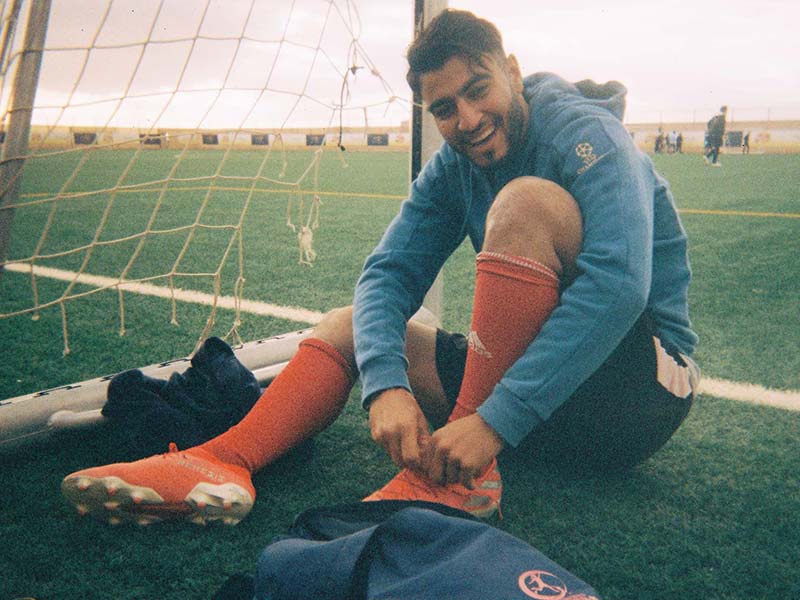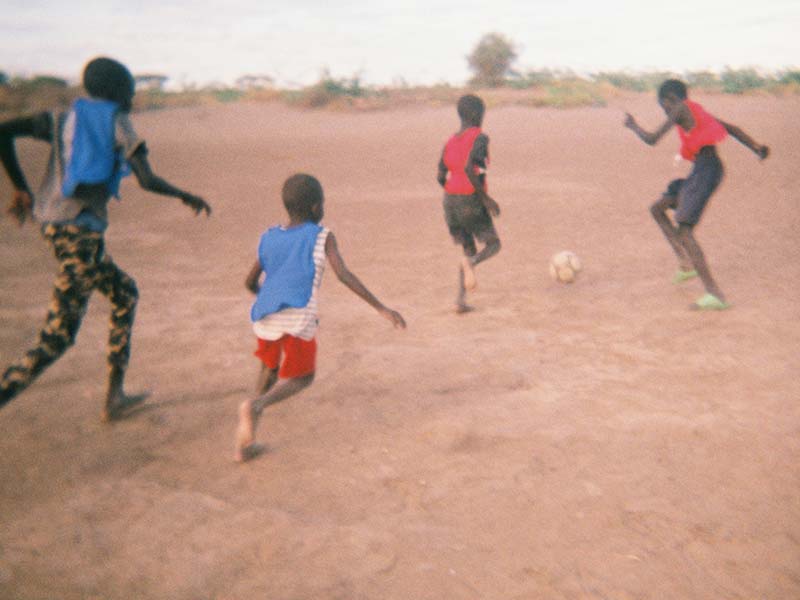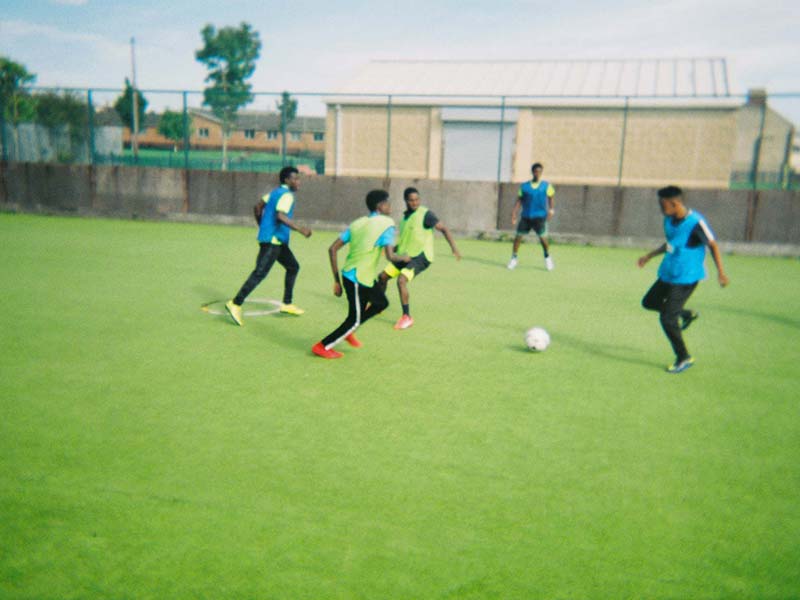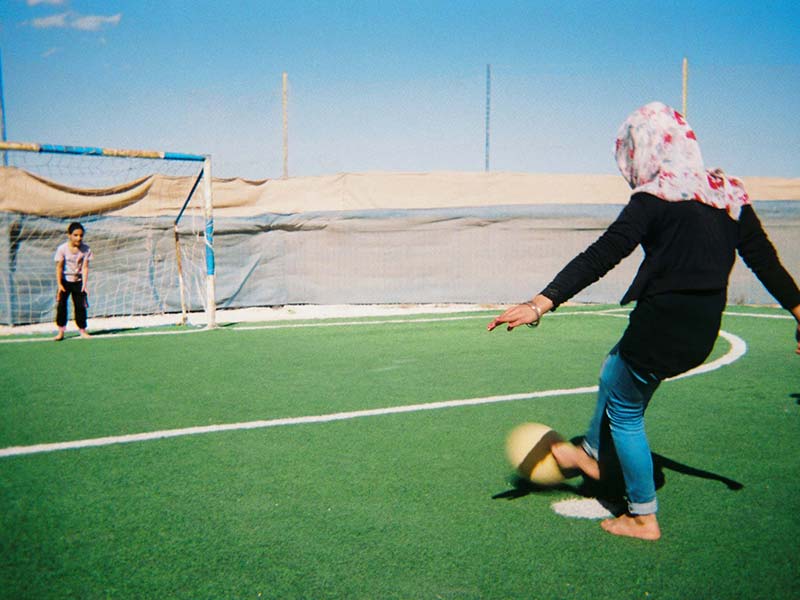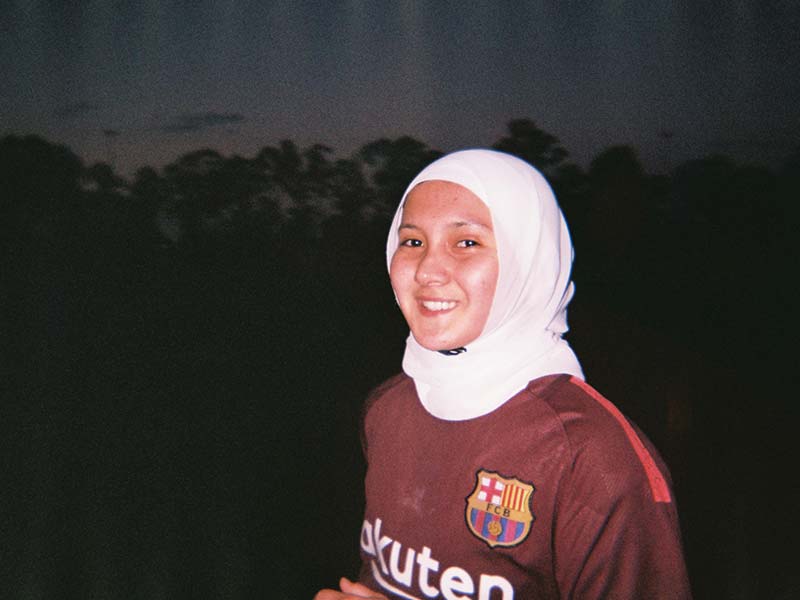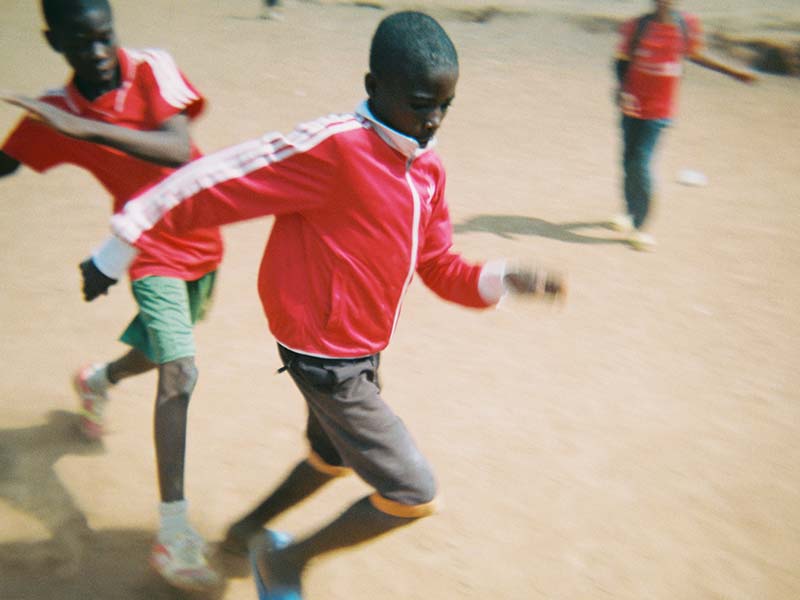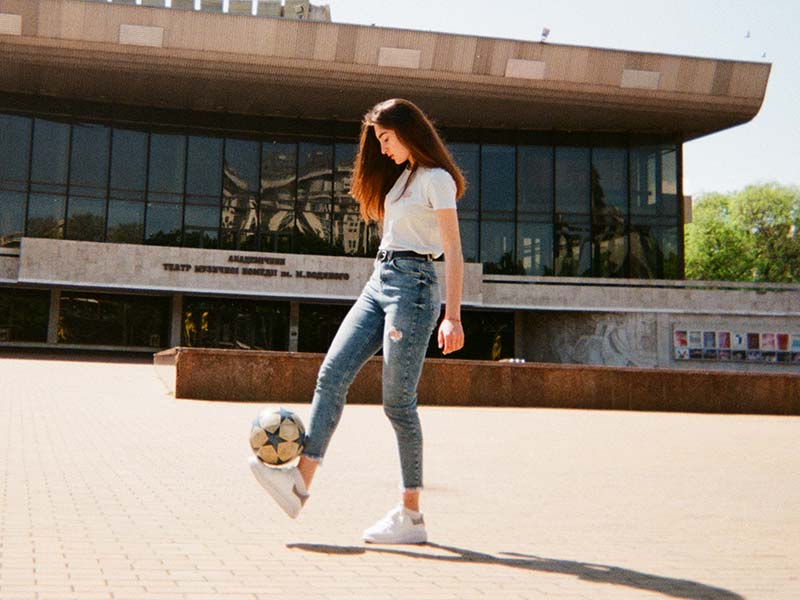Football as a common language in Kakuma Camp, Kenya

© Goal Click/UNHCR/Faulu Production/Ismail Mahamud Abdalla

Football as a common language in Kakuma Camp, Kenya
Kakuma refugee camp, in north-western Kenya, was established in 1992 following the arrival of the “Lost Boys of Sudan”. During that year, large groups of Ethiopian refugees fled their country following the fall of the government. Kakuma camp and the neighbouring Kalobeyei settlement have a population of over 196,000 registered refugees and asylum-seekers who receive support from UNHCR and partners. Most are from South Sudan, with others from countries including Somalia, Ethiopia, Burundi and the Democratic Republic of Congo.
South Sudan gained independence from Sudan in 2011. Since then the country has seen almost perpetual conflict. Nearly 2.3 million South Sudanese have fled to neighboring countries, making South Sudan the largest refugee crisis in Africa. An overwhelming majority – 83 percent – of the refugees are women and children and there are 65,000 unaccompanied or separated refugee children. An additional 2 million people are displaced inside the country.

Players from the refugee community at competitions organized by Faulu Production in order to promote peaceful coexistence among different communities. © Goal Click/UNHCR/Faulu Production/Ismail Mahamud Abdalla
Across Kakuma, international NGOs and local charities use football to make a difference to the lives of refugees. GIZ Sport for Development in Africa works with refugees and host communities. In the refugee community, GIZ has trained over 50 sports teachers and community coaches including Carlos Gatlliah, 25, from South Sudan and locals like Joseph Longok, who founded the Kakuma United Football team. Ismail Mahamud Abdalla, 29, is a Program Manager for Faulu Production, a community-based organization supporting refugees, disadvantaged women and vulnerable children. The NGO organises football tournaments to promote peaceful coexistence among different communities.
‘Refugees are real people who can enjoy the same full rights as others,’
Ismail Mahamud Abdalla, Kenya (FAULU)
“My name is Ismail Mahamud Abdalla. I am 29 years old and originally from Kalemie, in Tanganyika province in the Democratic Republic of Congo. I am currently volunteering as a Program Manager with Faulu Production.
I was not born into a football family, but later on considered football as my favourite game. I dreamt football would change my life not only through entertainment, but as the activity through which I would be earning a living once I expanded my talent. Thus, I started playing football when I was six until I was 22, when I broke my left hand while a goalkeeper.
The photos try to portray that refugees are real people who can enjoy the same full rights as others regardless of their status. Moreover, they portray the social cohesion and coexistence among the refugee communities through games and football. There are different people of various backgrounds; however, they share one talent, which is football. Most of the players come from the refugee community. They are Congolese, Burundian, South Sudanese, and Sudanese. Their stories are so shocking since they fled their countries to escape atrocities.
As I was a good speaker who could represent others, I was advised to pursue storytelling (journalism) and joined a football club where I played as a goalkeeper from 1995 until the war of the liberation broke out. My family fled to the mountains, where we had no chance to play football, since had to remain quiet for fear of being attacked by the rebels or the deserting government forces. One year later we returned home though the security was not yet restored. We were recommended to take a ship up to Mpulungu in Zambia, where we lived for some time until repatriation in 2009. There I got the chance to continue learning and play football for both schools and in leagues where our small club won three local cups. The toughest game that I will never forget was when we played a final in September 2009 with a Tanzanian club “Kasanga Boys” on the border between Zambia and Tanzania. I was goalkeeper and captain of our club “FC Simba”. It reached a penalty shootout, where I was able to save three penalty kicks and we won the cup. Unfortunately, I broke my left hand when saving the last penalty.
(16) My friend in a blue shirt is from DR Congo (South Kivu province) and is married with two kids. We learnt together at primary level and met again here in Kakuma camp. He has been a primary school teacher for six years and is a footballer playing number 8, 9, or 10. The horrible thing that I cannot forget about him is that two days after this competition his wife passed away during maternity. Now he is only raising his two young kids alone.
(10) The boy is a Burundian national and high school student. His family fled from Burundi to Kakuma when he was six. He dreams of one day joining Manchester United,
(13) The young girl is a South Sudanese national born and raised in Kakuma refugee camp. Her family fled conflict in Jonglei State in 1992. She is a footballer and energizer. She sees her only opportunity for her life in playing football. She has been participating in different competitions organized by the UNHCR and Lutheran World Federation (LWF). She is a defender but also a survivor of stereotypes, since in their community, girls are often not allowed to participate in such games, as they are only for boys.
(15) The tall guy is a Congolese man. He is married with two kids. He has been playing football since he was four until now (he is 34). Some of his successes include running an organization advocating for the protection of the environment (USEC) and being the winner of the Kakuma Premier League Cup.
(16) The young man is a Sudanese national. He fled to Kakuma to escape danger in Sudan (in Darfur).
(22) My cousin’s five-year-old daughter, Safi Malilo, who enjoys playing football more than anything.
Football is important to my life since it is enjoyable, it physically builds our bodies, and creates job opportunities. It brings people together and thus creates coexistence and social interaction, it serves as the way for community mobilization and participation.
I play football with Kenyans, though not often like before. Kenyans are good people with a good cultural background. They welcome everyone into their community. They are also talented in many ways, but mostly on Olympics and marathon running. My ambition for my future life is to get settled or resettled, which would enable me to enjoy life with more freedom, doing business, and other rights as the nationals do.”
Photo: © Goal Click/UNHCR/Ascent Soccer/Vava Badere

© Goal Click/UNHCR/Ascent Soccer/Vava Badere
‘Refugees are real people who can enjoy the same full rights as others,’
Ismail Mahamud Abdalla, Kenya (FAULU)
“My name is Ismail Mahamud Abdalla. I am 29 years old and originally from Kalemie, in Tanganyika province in the Democratic Republic of Congo. I am currently volunteering as a Program Manager with Faulu Production.
I was not born into a football family, but later on considered football as my favourite game. I dreamt football would change my life not only through entertainment, but as the activity through which I would be earning a living once I expanded my talent. Thus, I started playing football when I was six until I was 22, when I broke my left hand while a goalkeeper.
The photos try to portray that refugees are real people who can enjoy the same full rights as others regardless of their status. Moreover, they portray the social cohesion and coexistence among the refugee communities through games and football. There are different people of various backgrounds; however, they share one talent, which is football. Most of the players come from the refugee community. They are Congolese, Burundian, South Sudanese, and Sudanese. Their stories are so shocking since they fled their countries to escape atrocities.
As I was a good speaker who could represent others, I was advised to pursue storytelling (journalism) and joined a football club where I played as a goalkeeper from 1995 until the war of the liberation broke out. My family fled to the mountains, where we had no chance to play football, since had to remain quiet for fear of being attacked by the rebels or the deserting government forces. One year later we returned home though the security was not yet restored. We were recommended to take a ship up to Mpulungu in Zambia, where we lived for some time until repatriation in 2009. There I got the chance to continue learning and play football for both schools and in leagues where our small club won three local cups. The toughest game that I will never forget was when we played a final in September 2009 with a Tanzanian club “Kasanga Boys” on the border between Zambia and Tanzania. I was goalkeeper and captain of our club “FC Simba”. It reached a penalty shootout, where I was able to save three penalty kicks and we won the cup. Unfortunately, I broke my left hand when saving the last penalty.
(16) My friend in a blue shirt is from DR Congo (South Kivu province) and is married with two kids. We learnt together at primary level and met again here in Kakuma camp. He has been a primary school teacher for six years and is a footballer playing number 8, 9, or 10. The horrible thing that I cannot forget about him is that two days after this competition his wife passed away during maternity. Now he is only raising his two young kids alone.
(10) The boy is a Burundian national and high school student. His family fled from Burundi to Kakuma when he was six. He dreams of one day joining Manchester United,
(13) The young girl is a South Sudanese national born and raised in Kakuma refugee camp. Her family fled conflict in Jonglei State in 1992. She is a footballer and energizer. She sees her only opportunity for her life in playing football. She has been participating in different competitions organized by the UNHCR and Lutheran World Federation (LWF). She is a defender but also a survivor of stereotypes, since in their community, girls are often not allowed to participate in such games, as they are only for boys.
(15) The tall guy is a Congolese man. He is married with two kids. He has been playing football since he was four until now (he is 34). Some of his successes include running an organization advocating for the protection of the environment (USEC) and being the winner of the Kakuma Premier League Cup.
(16) The young man is a Sudanese national. He fled to Kakuma to escape danger in Sudan (in Darfur).
(22) My cousin’s five-year-old daughter, Safi Malilo, who enjoys playing football more than anything.
Football is important to my life since it is enjoyable, it physically builds our bodies, and creates job opportunities. It brings people together and thus creates coexistence and social interaction, it serves as the way for community mobilization and participation.
I play football with Kenyans, though not often like before. Kenyans are good people with a good cultural background. They welcome everyone into their community. They are also talented in many ways, but mostly on Olympics and marathon running. My ambition for my future life is to get settled or resettled, which would enable me to enjoy life with more freedom, doing business, and other rights as the nationals do.”
We play with Kenyans, ‘they are great, friendly people,’
Carlos Gatlliah, Kenya (GIZ)
“I am Carlos Gatlliah, South Sudanese by nationality, 25 years in age and still single. I came to Kakuma in March 2014. I work at the Danish Refugee Council (DRC) youth center in Kakuma Camp 4 as a sports coordinator, a youth trainer in life-skills and resilience, and peer counsellor. I am also a football coach, a community facilitator and leader in various activities especially those involving the youth. I attended the GIZ-Sport for Development in Africa course in 2017 through DRC.
I left my country because of the civil war that broke out in 2013. It became worse in November 2013, forcing me and others to seek a safe haven, and for me to be able tocontinue with schooling while seeking better opportunities in life. Since then, I have lived here in Kakuma.
These photos show South Sudanese youth playing football in Kakuma Camp 4 in preparation for the Camp 4 League. The major inhabitants are South Sudanese communities and significant populations of Burundians and Congolese.
I actively played football back in South Sudan and I play here in Kakuma. In South Sudan I played for various clubs and at school. Currently, I play for leisure and fitness purposes.
Football is important as it brings interaction and unity amongst communities living in the camp and with the host community as well, fostering cohesion. Using football, we bring community members together for leaders to pass important information. It also nurtures talents that could help some youth play to professional levels.
We have played together with Kenyans since my arrival at the camp, in the league and within the communities. They are great, friendly people, and hospitable. They welcomed us as refugees despite our shortcomings – some South Sudanese were aggressive when they arrived, due to past experiences from the war.
I would like to become an accomplished psychologist to help youth in the camp who have mental trauma caused by the war in South Sudan. I completed a diploma course in Modern Applied Psychology in May 2020. I am now on the lookout for advanced courses in the same field and I would like to specialize in counselling. If possible, I would like to go back home and help people with trauma and stress from the war in the healing process, as well as build the country from the destruction caused by the prolonged conflict.”
Photo: © Goal Click/UNHCR/GIZ/Carlos Gatlliah

© Goal Click/UNHCR/GIZ/Carlos Gatlliah
We play with Kenyans, ‘they are great, friendly people,’
Carlos Gatlliah, Kenya (GIZ)
“I am Carlos Gatlliah, South Sudanese by nationality, 25 years in age and still single. I came to Kakuma in March 2014. I work at the Danish Refugee Council (DRC) youth center in Kakuma Camp 4 as a sports coordinator, a youth trainer in life-skills and resilience, and peer counsellor. I am also a football coach, a community facilitator and leader in various activities especially those involving the youth. I attended the GIZ-Sport for Development in Africa course in 2017 through DRC.
I left my country because of the civil war that broke out in 2013. It became worse in November 2013, forcing me and others to seek a safe haven, and for me to be able tocontinue with schooling while seeking better opportunities in life. Since then, I have lived here in Kakuma.
These photos show South Sudanese youth playing football in Kakuma Camp 4 in preparation for the Camp 4 League. The major inhabitants are South Sudanese communities and significant populations of Burundians and Congolese.
I actively played football back in South Sudan and I play here in Kakuma. In South Sudan I played for various clubs and at school. Currently, I play for leisure and fitness purposes.
Football is important as it brings interaction and unity amongst communities living in the camp and with the host community as well, fostering cohesion. Using football, we bring community members together for leaders to pass important information. It also nurtures talents that could help some youth play to professional levels.
We have played together with Kenyans since my arrival at the camp, in the league and within the communities. They are great, friendly people, and hospitable. They welcomed us as refugees despite our shortcomings – some South Sudanese were aggressive when they arrived, due to past experiences from the war.
I would like to become an accomplished psychologist to help youth in the camp who have mental trauma caused by the war in South Sudan. I completed a diploma course in Modern Applied Psychology in May 2020. I am now on the lookout for advanced courses in the same field and I would like to specialize in counselling. If possible, I would like to go back home and help people with trauma and stress from the war in the healing process, as well as build the country from the destruction caused by the prolonged conflict.”
Through football, we ‘speak one language,’
Joseph Longok, Kenya (GIZ)
“I was born here in Turkana County, Kenya, and I am from the host community. I am one of the beneficiaries of the refugee interventions in Kakuma having studied in refugee primary and secondary schools since I lived with my grandmother and couldn’t afford to study in the local Kenyan schools. I am currently a primary school teacher with the Lutheran World Federation (LWF) at a refugee school (Fashoda Primary School) and I am taking a degree offered by the scholarship programs in the camp. I am a football coach, trained by GIZ Sport for Development in Africa as an instructor and I coach various children and youth groups as well.
I also run sports activities in the camp, currently I am the Secretary General of the Kakuma Premier League Secretariat, and one of the founders and officials of the Kakuma United Football team which currently plays in the 2nd Division Western League in Kenya. I have played a lot of football at the district level through community clubs.
I wanted to portray the ability of different people to forget their national, ethnic and religious differences and play together and speak one language. Here, a group of youths from different nationalities are playing football together. In addition, it depicts the ability to share resources despite the differences, as well as other people with different interests carrying on with their daily lives (people passing the field carrying water, or herding livestock).
These are refugees who have fled their countries of origin due to various issues including wars, violence between communities, famine and other conflicts. The photos were taken at Kakuma Refugee Camp 1, near Clinic 4, close to the South Sudanese and Ethiopian communities.
Photo: © Goal Click/UNHCR/GIZ/Joseph Longok

© Goal Click/UNHCR/GIZ/Joseph Longok
Through football, we ‘speak one language,’
Joseph Longok, Kenya (GIZ)
“I was born here in Turkana County, Kenya, and I am from the host community. I am one of the beneficiaries of the refugee interventions in Kakuma having studied in refugee primary and secondary schools since I lived with my grandmother and couldn’t afford to study in the local Kenyan schools. I am currently a primary school teacher with the Lutheran World Federation (LWF) at a refugee school (Fashoda Primary School) and I am taking a degree offered by the scholarship programs in the camp. I am a football coach, trained by GIZ Sport for Development in Africa as an instructor and I coach various children and youth groups as well.
I also run sports activities in the camp, currently I am the Secretary General of the Kakuma Premier League Secretariat, and one of the founders and officials of the Kakuma United Football team which currently plays in the 2nd Division Western League in Kenya. I have played a lot of football at the district level through community clubs.
I wanted to portray the ability of different people to forget their national, ethnic and religious differences and play together and speak one language. Here, a group of youths from different nationalities are playing football together. In addition, it depicts the ability to share resources despite the differences, as well as other people with different interests carrying on with their daily lives (people passing the field carrying water, or herding livestock).
These are refugees who have fled their countries of origin due to various issues including wars, violence between communities, famine and other conflicts. The photos were taken at Kakuma Refugee Camp 1, near Clinic 4, close to the South Sudanese and Ethiopian communities.

